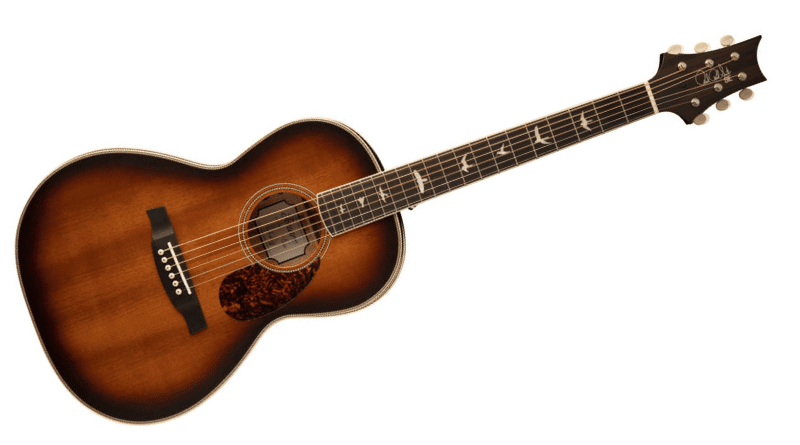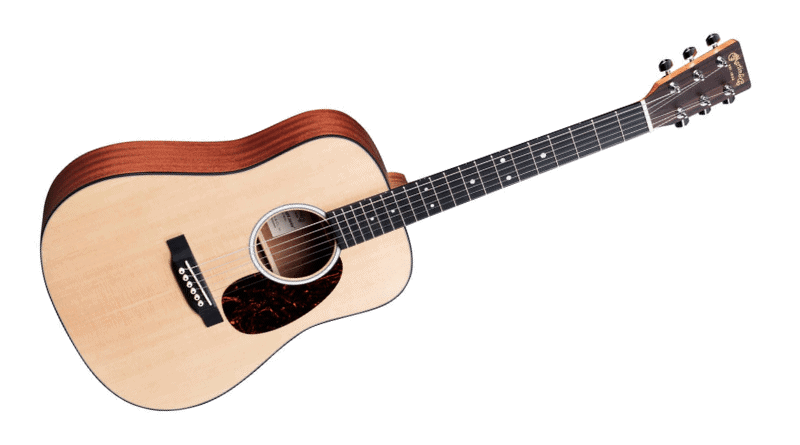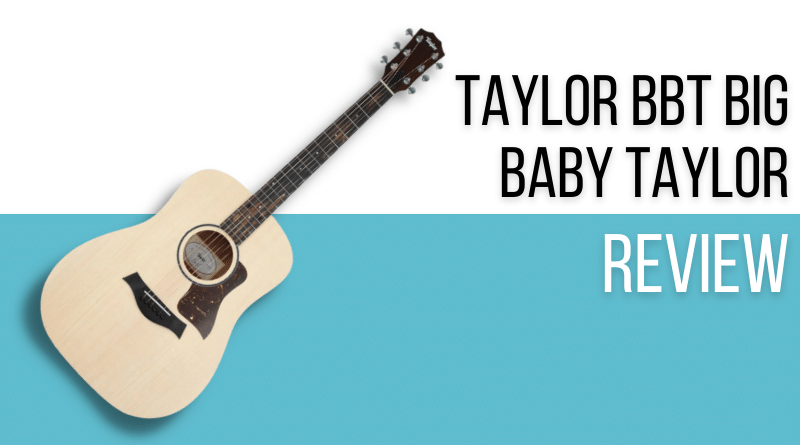Taylor is a brand that’s become closely associated with high-end guitars, but thanks to their Baby Taylor series, they have well and truly cracked the beginner market, too. For many, however, the biggest issue with the Baby Taylor is its small size. Enter the Taylor BBT Big Baby Taylor.
The Big Baby Taylor, at 15/16 size, is only marginally smaller than a full-size dreadnought. On paper, this makes it an excellent prospect for any player looking to get a quality guitar from a big brand like Taylor without breaking the bank.
We named this model our Editor’s Choice in our roundup of the best acoustic guitars under $500. The question is, with its smaller dimensions, can it truly replace a full-size instrument for the average player?
In this KillerGuitarRigs Review, we put a Taylor BBT Big Baby Taylor through its paces to find out if it’s something you should consider, or whether you should opt for a standard-size guitar. Keep on reading to learn more!
Read more about our review process.
Contents
Who Is It For?
We think that the Taylor BBT Big Baby Taylor is well suited for players of all ability levels. Whether you’re a novice looking for a quality instrument, or an intermediate or advanced guitarist looking for a more portable instrument without sacrificing tone, this is truly a great option.
Appearance / Features / Controls
The Taylor BBT Big Baby Taylor is built with a solid Sitka spruce top, paired with walnut back and sides. This contemporary combination really does look great, and it’s clear that thought has gone into the selection of woods for the tops. Ours had a lovely grain pattern. It’s not necessarily something we expect at this price point, so it’s especially nice to see.
It has a square shoulder dreadnought body shape and was noticeably slimmer than a standard dreadnought, which really went a long way to improving the comfort and ergonomics. Even though it’s a smaller guitar, it still features a full 25.5” scale, so players who are used to larger guitars shouldn’t struggle with the transition.
It had a sleek, contemporary look with a simple rosette and a nice tortoiseshell pickguard that broke up the front and really improved the aesthetic over the base model Baby Taylors.
As for the hardware, it was loaded with Taylor-branded sealed-gear tuning machines. They were chrome plated and looked great on the guitar. Not only did they look good, but they offered solid performance in terms of stability and fine-tuning. Contributing to the tuning stability, it featured a Tusq nut, which is yet another high-end feature we usually see on more expensive models. Another plus for the Big Baby Taylor.
The maple neck was exceptionally slim and had a lovely satin finish on the back. It was very comfortable and definitely designed with playability in mind. The most interesting part, and something that is likely to divide opinion, is the fact that the neck isn’t set or even bolted on. It’s actually screwed on. This of course explains how Taylor are able to keep the price so low, as this construction method drastically reduces manufacturing time.
Rounding up the features, it came with a really nice gig bag, like all Taylor guitars. It was well padded and should definitely keep the Big Baby Taylor well protected if you decide to travel with it.
Performance / Sound
Where the Big Baby Taylor really shines is with its playability. The slightly smaller size really makes it an incredibly comfortable guitar. To hold, it feels more like a concert size, but having the dreadnought shape really helps with volume and projection at the same time.
However you feel about the screwed-on neck, there’s no denying there are some associated benefits. This design allowed Taylor to completely remove the neck heel, providing almost unheard of upper fret access on a non-cutaway dreadnought. This, paired with the slim profile, made for a fast-playing, comfortable instrument that players of all abilities will enjoy.
Tonally, we found it to be well-balanced and surprisingly nuanced. It had a lot of midrange focus, but the bottom end was definitely present, and the solid Sitka spruce ensured it had enough top-end sparkle. In all, we had zero complaints about the way it sounded.
As mentioned, the dreadnought shape ensured excellent projection and considering the slimline body, it was incredibly loud and punchy. It performed well with a softer touch and delicate fingerstyle pieces and held its own in a mix as a rhythm guitar. Note separation and articulation were also strong with this guitar.
Right out of the box, it was well set up with a comfortable action and was just about perfectly intonated, too. Being full scale, we did find that the string tension caused a little fatigue after extended play, but the average guitarist isn’t likely to put that many hours on it in such a small space of time.
Other Guitars to Consider
If you’re shopping for guitars around the $500 mark, you’re going to be spoiled for choice. Of course, we love the Big Baby Taylor, but there are definitely some other great options available, too. Check out these alternatives if you’re not quite sold on the Taylor!
PRS SE Parlor P20

If the idea of a reduced-size guitar from a big-name brand appeals to you, there’s a good chance you’ll love the PRS SE Parlor P20. This guitar was one of our favorites in our best parlor guitars roundup thanks to its gorgeous tones and effortless playability. It’s built to the highest standards, with solid mahogany for the top and even a genuine bone nut. Overall, it’s a very comfortable guitar that travels exceptionally well.
Martin D-Jr 10

The Martin D-Jr 10 is built to compete with the Big Baby Taylor. Like the Taylor, it’s a slightly less than full-size dreadnought, featuring a solid Sitka spruce top. But in this case, it has solid sapele on the back and sides, an upgrade from the laminate walnut on the BBT. Sapele is a wood that delivers a slightly darker, warmer tone than the characteristically bright Taylor. This makes it a great choice for those looking for a more mellow instrument.
Final Thoughts on the Taylor BBT Big Baby Taylor:
We found that the Taylor BBT Big Baby Taylor was a genuinely strong performer across the board. It wasn’t perfect, but all of the usual must-haves at its price point were checked off – well balanced tones, good build quality, properly intonated, and solid tuning stability.
So to answer the question posed at the beginning of this review – Yes, we do think the BBT works as a standalone guitar. Sure, it’s a great backup or travel guitar for players with multiple instruments, but if you’re looking for something a little more special than the usual budget models, we think this is a fantastic option.


